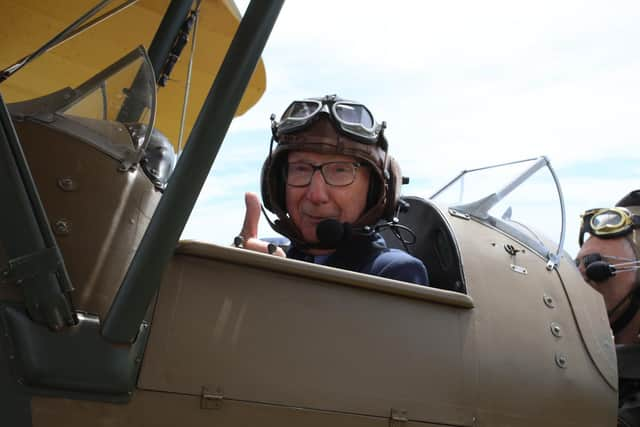Northampton WWII veteran Eddie will be thinking about those he lost on VE Day anniversary
and live on Freeview channel 276
VE Day did not mean the end of the Second World War for Edwin 'Eddie' Habberley from Northampton.
The then-21-year-old Royal Air Force pilot spent May 8, 1945, in a hospital in India after his Spitfire crashed in then-Burma on the way back from a patrol.
Advertisement
Hide AdAdvertisement
Hide AdNow 96, the great-grandfather is looking forward to thinking about his service and those who made the ultimate sacrifice on the 75th anniversary on Friday (May 8).


"I will remember all the things that went on and be thankful that we came home," he said.
Eddie grew up in London and was there when the war started but he was not evacuated; instead being sent on to rooves to search for incendiary bombs dropped during the Blitz.
His interest in flying as a boy and watching dog fights over London during the Battle of Britain inspired him to volunteer for the RAF aged 17 in February 1942.
Advertisement
Hide AdAdvertisement
Hide AdEddie was put on deferred service until he turned 18 before starting his training in Newquay, Cornwall.
From there, he went to the USA for a year of further training before returning to the UK for extra flying, eventually joining the war effort in the Middle East.
Eddie flew Spitfires down the Suez Canal, as well as in India where he went to 'jungle school' to learn how to survive in the wild if his plane crashed.
"By the time I was there, the RAF had cleared the skies of the Japanese aircraft so all we were doing was patrols and anything requested by the army or the navy," he said.
Advertisement
Hide AdAdvertisement
Hide AdIt was at the end of one of these patrols in Burma, now Myanmar, when his Spitfire crashed.
"It was a bit frightening but someone saw me go down and got me out of the cockpit," he recalled.
"I don't know how long I was there, to be honest, but I was moved to a field hospital then to Calcutta [now Kolkata]."
Looking back on his service, Eddie said he loved flying and being part of the RAF 'family', which he described as 'a wonderful life'.
Advertisement
Hide AdAdvertisement
Hide AdHe lost a few friends from his training corp during the war, who he would find out about intermittently as they were spread so far apart.
"One chap I was particularly friendly with died. After I came back from training, I heard he was shot down in Yugoslavia," he said.
After Victory in Japan was declared, Eddie was transferred to Hong Kong where he did more patrols in his Spitfire, looking out for any remaining insurgents.
He returned home in August, 1946, and a year later married his childhood sweetheart Margaret, known to everyone as Peggy.
Advertisement
Hide AdAdvertisement
Hide AdThey moved to the Scottish borders for Eddie's work as a Guinness salesman, raising two children together, before moving to Northampton where Peggy was evacuated to during the war.
Eddie's 'wonderful wife' Peggy died two years ago after 70 years of marriage, which he described as having 'no complaints at all'.
These days he lives independently in Duston, relying on a relative for his shopping during the coronavirus lockdown.
"It's not too bad, you know you have got to do it but I haven't left the house for six weeks and it is starting to get quite boring," he said.